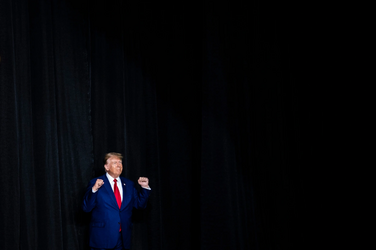
WASHINGTON — The Supreme Court on Monday overturned a Colorado court ruling that said former President Donald Trump was ineligible to run for office again because of his actions leading up to the Jan. 6 attack on the Capitol — bringing a swift end to a case with huge implications for the 2024 election.
The court in an unsigned ruling with no dissents reversed the Colorado Supreme Court, which determined that Trump could not serve again as president under section 3 of the Constitution's 14th Amendment.
The court said the Colorado Supreme Court had wrongly assumed that states can determine whether a presidential candidate is ineligible under a provision of the Constitution’s 14th Amendment.
The ruling makes it clear that Congress, not states, has to set rules on how the 14th Amendment provision can be enforced. As such the decision applies to all states, not just Colorado.
"Because the Constitution makes Congress, rather than the states, responsible for enforcing section 3 against all federal officeholders and candidates, we reverse," the ruling said.
The decision comes just a day before the Colorado primary.
In addition to ensuring that Trump remains on the ballot in Colorado, the decision will li similar cases that have arisen. So far only two other states, Maine and Illinois, have followed Colorado's path. Like the Colorado ruling, both those decisions were put on hold.
The Supreme Court decision removes one avenue to holding Trump accountable for his role in challenging the 2020 election results, including his exhortation that his supporters should march on the Capitol on Jan. 6, when Congress was about to formalize President Joe Biden's win.
Trump is facing criminal charges for the same conduct. The Supreme Court in April will hear oral arguments on Trump's broad claim of presidential immunity.
The Colorado court based its Dec. 19 ruling on section 3 of the Constitution’s 14th Amendment, which prohibits those who previously held government positions but later “engaged in insurrection” from running for various federal offices.
The provision was enacted after the Civil War to prevent former Confederates from returning to power in the U.S. government.
The case raised several novel legal issues, including whether the language applies to candidates for president and who gets to decide whether someone engaged in an insurrection.
The state high court’s decision reversed a lower court’s ruling in which a judge said Trump had engaged in insurrection by inciting the Jan. 6 riot but that presidents are not subject to the insurrection clause of the 14th Amendment because they are not an “officer of the United States.”
Trump and his allies raised that point as well as other arguments that the 14th Amendment cannot be applied. They also argued that Jan. 6 was not an insurrection.
Republicans, including Trump’s primary opponents, broadly supported his claim that any attempt to kick him off the ballot is a form of partisan election interference. Some Democrats including California Gov. Gavin Newsom have also expressed unease about the 14th Amendment provision being used as a partisan weapon.
The initial lawsuit was filed on behalf of six Colorado voters by the left-leaning government watchdog group Citizens for Responsibility and Ethics in Washington and two law firms.
They alleged in court papers that Trump “intentionally organized and incited a violent mob to attack the United States Capitol in a desperate attempt to prevent the counting of electoral votes cast against him.”
Colorado is one of more than a dozen states that has its primary election on Tuesday.
https://www.nbcnews.com/politics/su...rump-cannot-kicked-colorado-ballot-rcna132291 (Archive)
